SEATTLE — I am here attending the geekfest of geekfests called Gnomedex. Its name is a play on the old tech conference Comdex, which ironically doesn’t exist anymore. Coming here is a throwback to my time as a pure tech journalist going to conferences such as Macworld and the Consumer Electronics Show. But what’s interesting is that even in the geekiest settings, and perhaps especially in the geekiest settings, social media has come to the fore.
At the opening night party last night, people mingled, played with the cool Microsoft Surface table-top computers, and had nametags with only one affiliation attached to their name — their Twitter handle. No company, no town, just their Twitter home. And it’s no surprise that the self-proclaimed geeks of Gnomedex have been on top of social media from the start, helping build the tools that help us share our content.
As organizer Chris Pirillo, whose cartoon visage is the emblem of Gnomedex, explains in the program guide:
Nine years ago, a few of us where already using tools that would later become the centerpieces of a movement currently known as “social media.” We didn’t need a catchphrase to figure out their relevance in our personal and/or professional lives, either.
One thing I was happily anticipating was how Pirillo could pull off Net access for a room of a few hundred people, all of whom would want to be online blogging. Sure enough, there are plenty of electrical outlets for all the laptops, as well as the requisite candy and Starbucks coffee thermoses. Pirillo told me one of his biggest fears for the conference was whether Internet access would hold up. We’ll see.
Pirillo is now on stage warming up the audience.
Pirillo: I can’t imagine a life without technology. There are people out there who don’t have access to technology.
Last year, Beth Kanter (@kanter) asked the community to donate to a fund to help a girl from Cambodia go to college. We were able to raise $3,000 to send two girls to college, using social networks and Twitter.
It’s not just for geeks anymore, even though I identify myself as one. It’s the world at our fingertips and we have a lot of power when we decide what to share. Twitter is a great place to tell people things without thinking about it.
The Art of the Interview
Next up is Warren Etheredge, who hosts 250 events per year, as well as a podcast and TV series. His talk is about how to do good interviews.
Warren Etheredge: You must listen in an interview. And I never bring any questions to an interview. We usually want people to say what we want them to say. So we only ask questions, leading questions like “So death panels are a bad thing, yes?” People are trying to dictate the story with their own assumptions.
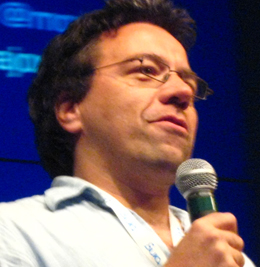
I do a lot of research beforehand. Lawyers say don’t ask a question that you don’t know the answer to. But I do the opposite. I want to ask questions that I don’t know the answer to.
Doing good interviews is like making love. It’s about paying attention to the other person. There’s a three-step process for what I think is important:
> Get interview subject’s attention. Shock them to get their attention.
> Get their trust.
> Earn their respect.
You are not there as a recording device, you are there to make a human connection. Have faith in yourself because if you know enough about the subject then you don’t need a script.
Keynote about Trust Agents
Now comes the keynote from Chris Brogan and Julien Smith, who wrote the book, “Trust Agents.” Brogan is a longtime blogger and social media expert, who runs New Marketing Labs, a social media expert.
Julien Smith: The attention wars. We can only pay attention to one thing at a time. The difference between what we were doing 20 years ago and now is that everyone’s competing for everyone’s attention. You’re competing with the 6 o’clock news and literally everything in the world.
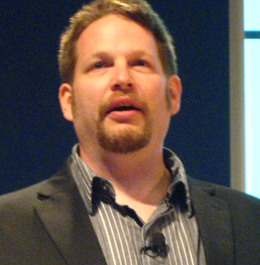
Chris Brogan: There are three levels of attention: awareness, reputation and trust. The short attention span can be a problem with causes. You get bored.
Smith: Say you have a basketball team and they are smaller and weaker than everyone else. A high school team in Silicon Valley was weak, so they decided to use an aspect of the game no one used. They came up with a full court press, and they were able to separate themselves from other teams.
Brogan: There are three levels to any game. There’s playing the game, hacking the game and programming the game. It’s like Doom. Then you got the mods, and then you started programming it.
To play your own game, come up with your own word. Create a new word for yourself.
Brogan: I was the tech expert on the Dr. Phil show, and the guests were brought up from the audience as “one of us.” The woman beside me said, “Are you someone?” And I said, “I’m frickin famous.” And she couldn’t figure out who I was.
Smith: Build off your previous success. Don’t ever start from zero.
Brogan: What Chris has done here with Gnomedex is to build a network of people. He’s a great example.
Smith: Be at the elbow of every great transaction. You don’t have to be in the transaction, but be in the group where the interaction is happening. If you are the connector between several networks, then you are at the center of everything.
[Plays photos of various people who are at the conference and praises them.]
Brogan: How do you get people to answer your email?
Robert Scoble: I’ll always answer your email if your subject is: “I need your home address so I can send you $100.” A PR person sent me a bottle of tequila, it was great!
Brogan: I love when people send me schwag!
Brogan: My comic book guy has been reading my blog and following me on Twitter. Turns out he’s using all the stuff we blog about to do things for his comic book store. He direct-messages me when my favorite comic books come out.
For social media consultants, give your ideas handles, teach them to fish and bring your own dialtone.
Skepticism Online
Next up is Phil Plait, who writes the Bad Astronomy Blog, and is president of the James Randi Educational Foundation (well known skeptic).
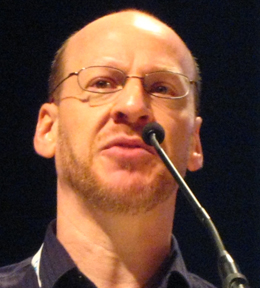
Phil Plait: Everyone is skeptical about something. Skepticism itself is misunderstood. It’s not cynicism, it’s not bitterness. It is:
Questioning
Demanding evidence
Examining evidence
Basing conclusions on previous experience
Using logic
Being willing to drop an idea if it’s wrong
Plait: There are people who believe that the moon landing in the ’60s was faked and they call themselves skeptics, but they aren’t. They didn’t examine the evidence.
I have a policy on my blog that if I say something wrong, I put in a strikethrough of what I got wrong and explain why.
There’s a lot of media promoting skepticism and debunking things. The TV show “Mythbusters” is about skepticism. That’s what they do. It’s not really science, but they’re using the scientific method and examine the hypothesis behind something. They never talk about being skeptical but that’s what they’re doing.
The point isn’t to come to a conclusion, the important thing is how you reach that conclusion.
There’s Jenny McCarthy who is now leading the anti-vaccine movement, saying that vaccines are causing autism, but it’s not true. The evidence doesn’t show that. You have to examine the evidence.
There’s an email going out saying that tonight if you look in the night sky, Mars will look as big as the moon. Now it’s true that if you magnify Mars on a certain date by 75x it will look as big as the moon to the naked eye, but that got changed to saying that you just have to look at the sky to see them at the same size.
Why is skepticism important? It sucks to be fooled: you can lose your money, and you can lose your life. Wouldn’t you rather see life for how it really is, and not how someone else wants you to see it?
You wanna be a skeptic? Have you ever…
> Sent your mom to Snopes.com
> Emailed an advertiser
> Yelled at your TV
> Tweeted about something you didn’t believe
We have $1 million in an account and will give that to anyone who can prove with complete statistical certainty that they have had a paranormal experience, or can read minds, or name a randomly picked card from a deck. No one has won it yet.
Twitter is dangerous because you can re-tweet things quickly without making sure they’re true. Now Reddit has a skepticism section. Digg doesn’t have anything like that. It’s good to see that social networks are picking this stuff up.
There was a fireball video on local TV, and it was picked up by online news, TV news, Twitter, and it was very difficult to get the word out that it wasn’t true. I was trying to fix this. These things keep happening. How do we fight these things? I don’t know. I do have some ideas: fight it, participate, join and start something.
The Robots that Sharing Built
Bre Pettis is talking about how how sharing helped build an open source 3D printer, for his company MakerBot Industries.
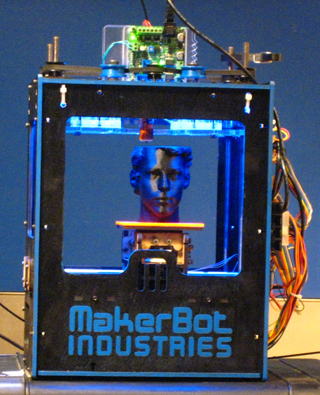
Bre Pettis: We are the first ones to crowdsource making a machine, our 3D printing machine.
[Shows video of how designers came up with egg-shaped salt-and-pepper shakers, that will be made with MakerBot 3D printer. Machine pulls in string of plastic, heats it up, and then builds it layer by layer.]
Pettis: They went into production on the salt and pepper shakers, and tested it on a site called Thingiverse, where people can share things. Someone uploaded a skull, and we printed it out. You get bonus points for being able to print out body parts.
Sharing is the best thing ever. Anything that has any value I share with the Internet. People shouldn’t be afraid to share, or fear people stealing their ideas. A “Maker’s Mark” is a way of setting it free in the world but still saying “I came up with this idea.”
[Show’s Walt Disney’s head on a plate.]
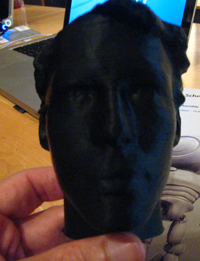
Pettis: Why would you want that? We printed that out but his head broke. Someone else uploaded an MRI of a brain. So we ended up making a Walt DIsney with a brain sticking out, and then someone made that into an egg cup. It was the 3D equivalent of a mashup.
Friendships and connections can start with sharing.
If you want to make something or want it to exist, you can do it, it’s just a matter of wanting it.
We’re obsessive open sourcers, and wanted to make this without using a proprietary, black box method.
Hacker Journalists and Wrap-Up
On the second day of Gnomedex, I led a talk about “Hacker Journalists” or programmer/journalists, detailing the history of computer-assisted reporting (CAR) and database journalism. I then brought real-life hacker journalist Jim Ray from MSNBC.com up on stage for a brief interview. Ray talked about his experience doing mash-up and database work at MSNBC.com for the election last year and for tracking hurricanes.
I also ran a contest for Gnomedex attendees to see who could come up with the best idea for a programmer/journalist project. I promised to run the best story ideas here on MediaShift, so here they are:
> Vancouver map mash-up showing how the 2010 Winter Olympics has changed the area recently and over the next 10 years.
> Compare water quality samples by locality, and make it a student project, so science students can all participate. The kids upload the data and then compare it to EPA data.
> Twitter Storm Watch. Have people collect local weather conditions during storms and use the new Twitter geo-location data.
> iPhone app that will show drill-down economic data for specific areas.
And the winning idea was (according to audience applause and support)… The water quality samples collection from science students! The winner was Chris Condayan, manager of public outreach for the American Society of Microbiology. I’ll be sending a free HD Flipcam to Chris, congrats!
*****
One final word on Gnomdex. I’m impressed with the longevity of the tech conference, and how Pirillo was able to build a community of people who care for each other, support each other, and welcome new people each year to the fold. Maybe even more impressive: The conference was a live-blogger’s dream, with a power cord for everyone’s laptop and plentiful bandwidth for all. I never experienced a dropped Internet connection and didn’t have to have a specific password to enter the WiFi network. It just worked. And that’s a real rarity at conventions.
Mark Glaser is executive editor of MediaShift and Idea Lab. He also writes the bi-weekly OPA Intelligence Report email newsletter for the Online Publishers Association. He lives in San Francisco with his son Julian. You can follow him on Twitter @mediatwit.
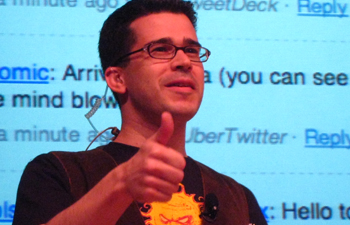

Great job, Mark! I couldn’t make it up this year.
fyi, it’s Beth Kanter (@kanter) … that’s live-blogging for you tho …
Hi JD,
Glad you enjoyed the stream from Gnomedex. Too bad you couldn’t make it…
Thanks for the catch. I fixed her name. You can guess how hard it is to spell names correctly while live blogging. That’s where the audience comes in!
Mark:
Very nice program, but a bit of selective editing. I notice the bio-tech based talks (life extension, protein folding joint computing project, and Blame Drew’s Cancer) didn’t get mentioned. They were also very interesting talks.
Great post – I’m missing gnomedex so much.
It was the tutition for one college student, Leng Sopharath. Chris’s trust equations really resonate for me.
For Leng Sopharath’s freshman year, it took me 2 weeks on my blog to raise her tutition.
The next year, Chris Brogan, helped me raised her sophmore year tuitition via Twitter.
Her junior year was gnomedex:
http://beth.typepad.com/beths_blog/2008/08/how-long-does-i.html
http://beth.typepad.com/beths_blog/2008/08/tracking-the-fl.html
What was even more amazing to me is that many of the folks in the audience – went off to raise money for projects they cared about in their own communities – Dave Delaney comes to mind.
Give the gnomedex a big hug from Leng Sopharath.
Beth
Great post – I’m missing gnomedex so much.
It was the tutition for one college student, Leng Sopharath. Chris’s trust equations really resonate for me.
For Leng Sopharath’s freshman year, it took me 2 weeks on my blog to raise her tutition.
The next year, Chris Brogan, helped me raised her sophmore year tuitition via Twitter.
Her junior year was gnomedex:
http://beth.typepad.com/beths_blog/2008/08/how-long-does-i.html
http://beth.typepad.com/beths_blog/2008/08/tracking-the-fl.html
What was even more amazing to me is that many of the folks in the audience – went off to raise money for projects they cared about in their own communities – Dave Delaney comes to mind.
Give the gnomedex a big hug from Leng Sopharath.
Beth
Good highlights, Mark. Enjoyed our conversation and your feedback, even though my idea didn’t make the top four. (I thought you said five….) I still think Transparency, Accountability and Openness (TAO) are keys to trusted journalism, whether hacker, mainstream, hyperlocal or whatever. More to come on that later. Cheers!